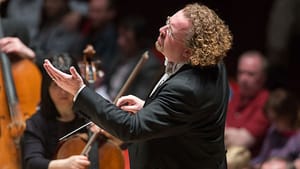Stay in the Loop
BSR publishes on a weekly schedule, with an email newsletter every Wednesday and Thursday morning. There’s no paywall, and subscribing is always free.
Perhaps a piece of Mahler
Philadelphia Orchestra presents 'Denève Conducts Mahler'

Stéphane Denève’s podium style has long been unclassifiable. Unlike Yannick Nézet-Séguin, music director to Denève’s principal guest conductor at the Philadelphia Orchesta, Dèneve rarely calls attention to himself while conducting. He’s a workhorse, not a show horse, to borrow an old cliché.
At the same time, I wouldn't categorize Denève as a pure servant of the music, like Claudio Abbado or Kurt Masur. While never taking wild liberties, he infuses the scores he conducts with his own brand of charisma and panache. Pianist Jean-Yves Thibaudet once described Denève’s style as “not a standard good-musician, good-technique sound,” and I agree.
Denève displayed both solid musicianship and personal flair when he led the Philadelphians in an eclectic program that jumped from a present-day genius to one of the all-time greats.
Start with the new
The orchestra’s current program — Denève Conducts Mahler — actually begins closer to home, with Pulitzer Prize winner and Curtis professor Jennifer Higdon’s On a Wire (2010). Higdon wrote the concerto grosso for the Chicago-based musicians’ collective Eighth Blackbird, who make their local debut in this series of performances.
The sextet stood out, and not just musically. Placed prominently in front of the orchestra, their eye-catching fashion choices told the audience what to expect. The female musicians — flutist Nathalie Joachim, violinist Yvonne Lam, and pianist Lisa Kaplan — opted for vibrantly colored formalwear, while the men — cellist Nicholas Photinos, percussionist Matthew Duvall, and clarinetist Michael J. Maccaferri — adopted a style best described as hipster chic. They looked distinctive amid the sea of black-clad players behind them.
Perhaps their sartorial style set the tone for some of the more conservative members in the audience. At intermission, I heard terms like “weird,” “new wave,” and “unintelligible.” What did these people hear that I didn’t? Sure, Eighth Blackbird’s performance style can be jarring — particularly in this piece, which begins with the ensemble members bowing the piano while Kaplan plays. This creates an eerie, ethereal tone, but certainly nothing unfamiliar to even a casual classical-music listener.
As the concerto progressed, the most common corollary I identified was Samuel Barber, the midcentury composer of unabashedly neoromantic music. This is perhaps unsurprising, as Higdon herself has often been called a neoromantic, sometimes derisively. When Eighth Blackbird played unaccompanied by the orchestra, my mind sometimes wandered to Barber’s rhapsodic setting of James Agee’s Knoxville: Summer of 1915. When Denève and the orchestra joined in, I heard the sweeping influence of “Adagio for Strings,” that favorite of many film scores.
Denève nicely underscored Eighth Blackbird when called upon, never allowing the orchestra’s sonic capabilities to overwhelm or pull focus from the soloists. Some audience members may disagree, but I hope to hear them again in Verizon Hall.
Taming Titan
Most of the audience came to hear Mahler’s Symphony No. 1 in D Major, which is sometimes referred to as Titan. If Denève took a backseat in the Higdon, he and his orchestra were undeniably the stars of this show. The conductor highlighted the many disparate elements that unfold over the work’s four movements. He particularly foregrounded the folk-dance influences in the second movement’s scherzo, and inspired a soundscape in the third movement that evoked the natural world. I pictured a summer evening spent dancing and swimming in the verdant Austrian countryside.
Other moments came together less well — particularly in the fourth movement, which tended to drag. Denève’s reading of this 20-minute section, titled “Stürmisch bewegt” (“Stormily agitated”), held all the overwhelming bluster of a mad reckoning between heaven, hell, and earth. But it often felt like that was all it had. Individual instruments and sections seemed less well-defined than I’m used to hearing, which minimized the orchestral colorings that are supposed to build as the piece progresses. This was a common problem, as Denève’s cueing often appeared imprecise.
Still, the overall evening could be primarily characterized by its musical strengths. A common complaint about the orchestra’s recent programming has been a lack of cohesion among selections paired on the same bill. Placing On a Wire and Titan together certainly falls squarely within this camp. But with a skilled and savvy interpreter like Denève at the helm, it’s often best to just relax and listen.
What, When, Where
Denève Conducts Mahler. Stéphane Denève, conductor; Eighth Blackbird, featured soloists. Jennifer Higdon, On a Wire; Gustav Mahler, Symphony No. 1 in D Major. Through October 21, 2017, at the Kimmel Center’s Verizon Hall, 300 S. Broad Street, Philadelphia. (215) 893-1999 or philorch.org.
Sign up for our newsletter
All of the week's new articles, all in one place. Sign up for the free weekly BSR newsletters, and don't miss a conversation.

 Cameron Kelsall
Cameron Kelsall